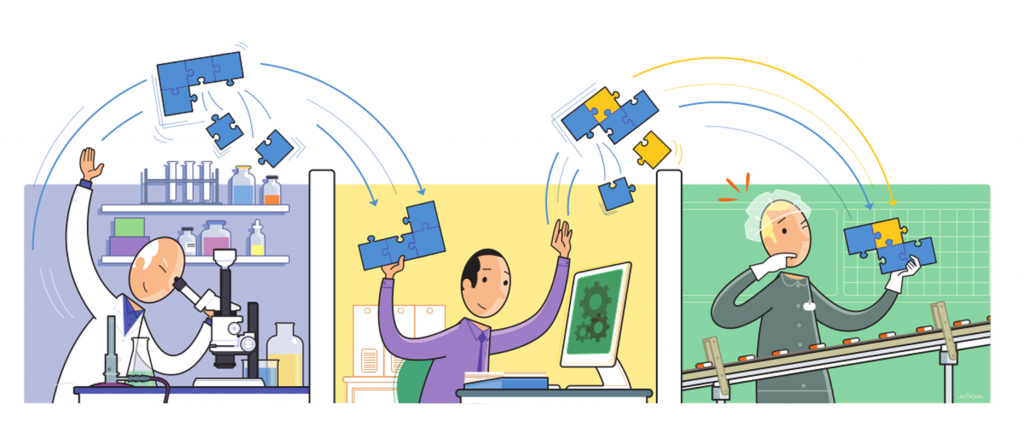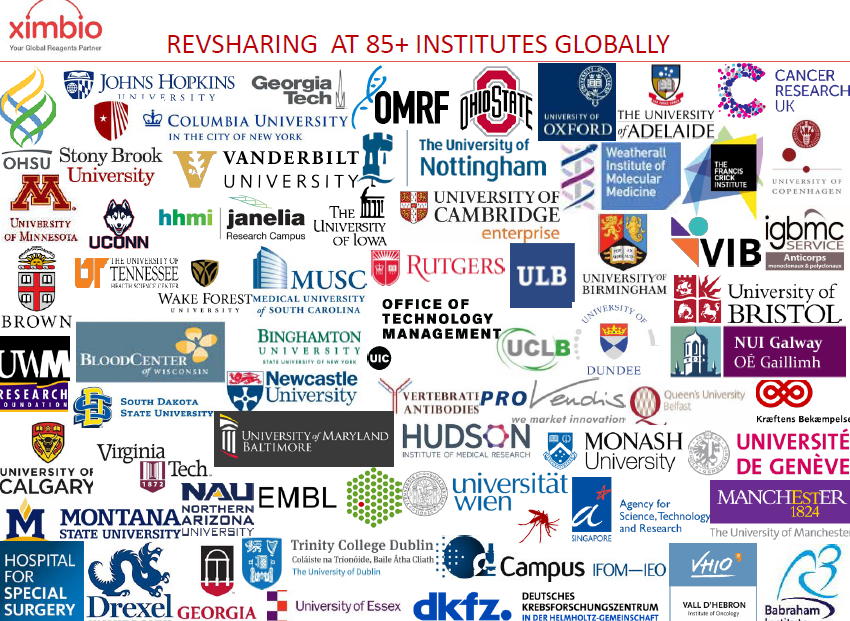By Janaina Pereira
Tech Transfer, also known as Technology Commercialization or Knowledge Transfer, is the process of transforming research ideas, systems, platforms, molecules, knowledge or technology into a commercial product or service. In the past ten years, the field has consistently grown as the knowledge transfer partnerships between academia and industry have expanded to include startups, according to an article published in Nature. This is a very exciting non-academic career for Ph.D.’s or any person with a scientific background, as you can actually participate in the thrilling process of converting research to a product. Therefore, iJOBS recently promoted a simulation event about Tech Transfer, where participants could hear directly from the field experts about their career path transitioning from academia to technology commercialization and patentability assessment, as well as participate in a case study.
[caption id="attachment_2959" align="alignnone" width="660"] Image source: https://compassmag.3ds.com/6/Cover-Story/TECH-TRANSFER[/caption] The event started with Dr. Yong Zhang and Dr. Lisa Lyu discussing their similar career paths: both started in academia but transitioned to Tech Transfer. Dr. Lyuholds a Ph.D. in Pharmacology, and before becoming a Licensing Manager/Patent Agent at Rutgers Office of Research Commercialization (ORC), she worked as a Postdoc and Assistant Professor, during which she developed an impressive track record in cancer pharmacology. Dr. Zhang holds a Ph.D. in Biochemistry and Molecular Biology, and researched important metabolic diseases for 7 years as a Post-doc before becoming a Senior Licensing Manager/Patent Agent at ORC. Among the many different careers in Technology Transfer, Dr. Zhang highlighted two and provided the steps to successfully move from academia to a Tech Transfer position:
Image source: https://compassmag.3ds.com/6/Cover-Story/TECH-TRANSFER[/caption] The event started with Dr. Yong Zhang and Dr. Lisa Lyu discussing their similar career paths: both started in academia but transitioned to Tech Transfer. Dr. Lyuholds a Ph.D. in Pharmacology, and before becoming a Licensing Manager/Patent Agent at Rutgers Office of Research Commercialization (ORC), she worked as a Postdoc and Assistant Professor, during which she developed an impressive track record in cancer pharmacology. Dr. Zhang holds a Ph.D. in Biochemistry and Molecular Biology, and researched important metabolic diseases for 7 years as a Post-doc before becoming a Senior Licensing Manager/Patent Agent at ORC. Among the many different careers in Technology Transfer, Dr. Zhang highlighted two and provided the steps to successfully move from academia to a Tech Transfer position:
- Academic Technology Transfer
- Business Development in Industry
Dr. Zhang and Dr. Lyu share a very similar career path, where both of them participated in the ORC Internship Program offered by ORC/Rutgers before achieving a position in the Tech Transfer field. The Internship Program is offered to postdoctoral trainees and senior graduate students that are interested in pursuing a career in Tech Transfer. The minimum requirements are at least two semesters commitment to the program with the capability of dedicating 5-10 hours (where 3-7 are working remotely hours) per week, as well as being a current Rutgers student or Postdoc, and have PI approval. During the internship, you will learn and develop skills to protect inventions, evaluation, and commercialization of inventions, and business terms used in diverse agreements. If you match the requirements and are interested in the internship program, apply now as applications are being accepted during the fall semester. We also had the opportunity to hear from Dr. Jon Viola, the Business Development Manager of Ximbio, about his career path from academia to the Tech Transfer field. Dr. Viola transitioned from academia directly to a position at Ximbio after he finished his Ph.D. in Biochemistry in early 2018. In Ximbio, the world’s largest non-profit tech transfer organization, Dr. Viola continues his relationship with academia by managing the US internship program for Ph.D. students and Postdocs, called “Ximbassador”, between Ximbio and affiliated Universities such as ORC/Rutgers.  The Ximbassador program is a part-time paid internship where Ph.D. students and Postdocs will closely work with laboratories on campus to uncover new reagents and materials that have a potential interest to other scientists. The internship requires five hours a week during a 6 month period, which involves biweekly meetings with ORC/Rutgers and the Ximbio team. During the internship, the Ximbassador will develop key skills for the Tech Transfer field such as negotiation, networking, product management, intellectual property knowledge and licensing. For more information about applying and requirements, please contact zhangy5@ored.rutgers.edu or ximbassador@ximbio.com
The Ximbassador program is a part-time paid internship where Ph.D. students and Postdocs will closely work with laboratories on campus to uncover new reagents and materials that have a potential interest to other scientists. The internship requires five hours a week during a 6 month period, which involves biweekly meetings with ORC/Rutgers and the Ximbio team. During the internship, the Ximbassador will develop key skills for the Tech Transfer field such as negotiation, networking, product management, intellectual property knowledge and licensing. For more information about applying and requirements, please contact zhangy5@ored.rutgers.edu or ximbassador@ximbio.com  At the end of the event, we participated in a fun invention summary simulation supervised by Dr. Zhang and Dr. Janet Alder, where we worked in groups to write a brief invention Summary about Cell Line Platform. The simulation consisted of reading a paper about the new discovery and writing about its background, invention, market application, and advantages. It was an exciting and changeling experience to read the paper and write a summary in just 30 minutes, while avoiding scientific jargon. However, it gave us an idea of the day-to-day challenges of the field. More information about the history of Tech Transfer can be found through the link. Junior Editor: Huri Mücahit Senior Editor: Monal Mehta
At the end of the event, we participated in a fun invention summary simulation supervised by Dr. Zhang and Dr. Janet Alder, where we worked in groups to write a brief invention Summary about Cell Line Platform. The simulation consisted of reading a paper about the new discovery and writing about its background, invention, market application, and advantages. It was an exciting and changeling experience to read the paper and write a summary in just 30 minutes, while avoiding scientific jargon. However, it gave us an idea of the day-to-day challenges of the field. More information about the history of Tech Transfer can be found through the link. Junior Editor: Huri Mücahit Senior Editor: Monal Mehta